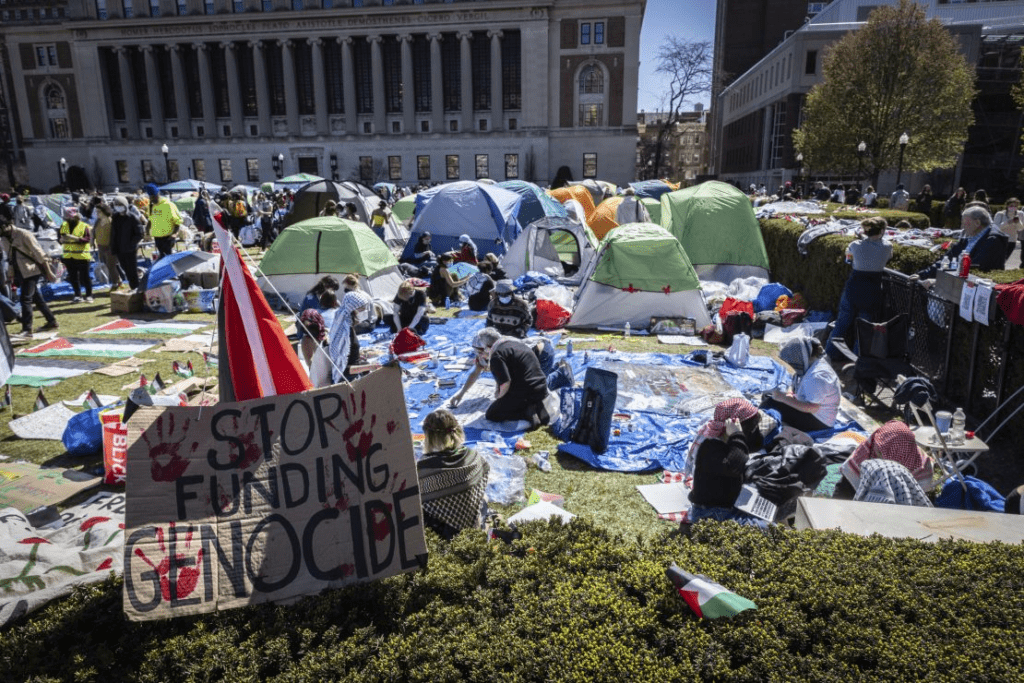Columbia University’s Current Stance
Columbia University, nestled in the heart of New York City, finds itself embroiled in a storm of tensions and protests as the debate over Palestinian rights continues to grip the campus community. As the university faces its seventh consecutive day of pro-Palestinian demonstrations, concerns about safety and security, particularly among Jewish students, have escalated, prompting significant actions from both the administration and concerned stakeholders.
Columbia’s Response:
In response to mounting safety concerns voiced by students, Columbia University announced a significant adjustment to its academic operations. Nearly all classes on its main campus will transition to a hybrid model, technology permitting, for the remainder of the semester. The university emphasized that this decision was driven by a commitment to ensuring the safety and well-being of its students amidst the ongoing tensions. Move comes in the wake of escalating tensions on campus and a growing sense of unease among the student body.
Protests Spread Across Campuses:
The protests at Columbia University have not occurred in isolation but have rather catalyzed solidarity demonstrations at other prominent institutions, including New York University (NYU), Yale, MIT, Harvard, and Boston University. At NYU, students and faculty members were reportedly arrested during demonstrations on Monday night. These events underscore the widespread impact of the issues at hand and the deep-rooted divisions they have exposed within academic communities across the United States.


Safety Concerns for Jewish Students:
As the Jewish holiday of Passover commenced on Monday, Jewish student organizations at Columbia have voiced heightened concerns about safety and security on campus. Reports indicate that security measures have been increased around Jewish gatherings, with a notable police presence at the campus Jewish cultural center. Some members of the Jewish community have expressed fear for their safety, with one rabbi advising students to consider returning home due to perceived risks. These developments highlight the complex intersection of identity, security, and activism that characterizes the current climate at Columbia University.
Pressure on University Leadership:
The escalating tensions have placed Columbia University’s president, Minouche Shafik, in a challenging position, caught between competing demands from various stakeholders. While some alumni and lawmakers have called for decisive action to quell the protests, others have cautioned against any measures that could be perceived as infringing upon freedom of speech. The House Committee on Education, led by Republican representatives, has urged President Shafik to intervene forcefully, calling for the dispersal of the protest encampment and potential disciplinary action against involved students and faculty. However, President Shafik’s decision to involve the New York Police Department in dispersing a pro-Palestinian protest last week has already drawn criticism from certain faculty members, complicating her response to the ongoing unrest.
Legal Implications and Congressional Scrutiny:
Amidst the turmoil, concerns have been raised about potential legal ramifications for the university. Lawmakers, including a delegation of Jewish representatives who visited the campus on Monday, have suggested that Columbia’s handling of the protests may constitute a violation of Title IX, a federal law prohibiting discrimination and harassment based on race or nationality. Republican Representative Virginia Foxx has issued warnings to university leaders, signaling potential consequences if the protests are not addressed swiftly and decisively.
Conclusion:
As tensions persist and protests continue to unfold, Columbia University finds itself at a crossroads, grappling with complex issues of safety, free speech, and institutional responsibility. The university’s decision to transition to hybrid classes reflects a concerted effort to prioritize the well-being of its students amidst a volatile situation. However, the path forward remains uncertain, with stakeholders on all sides of the debate closely watching President Shafik’s response and the university’s actions in the days and weeks to come.

[…] Prime Minister Narendra Modi made startling allegations, claiming that even the simple act of listening to the Hanuman Chalisa has become a crime under the rule of the Congress party. This assertion has […]